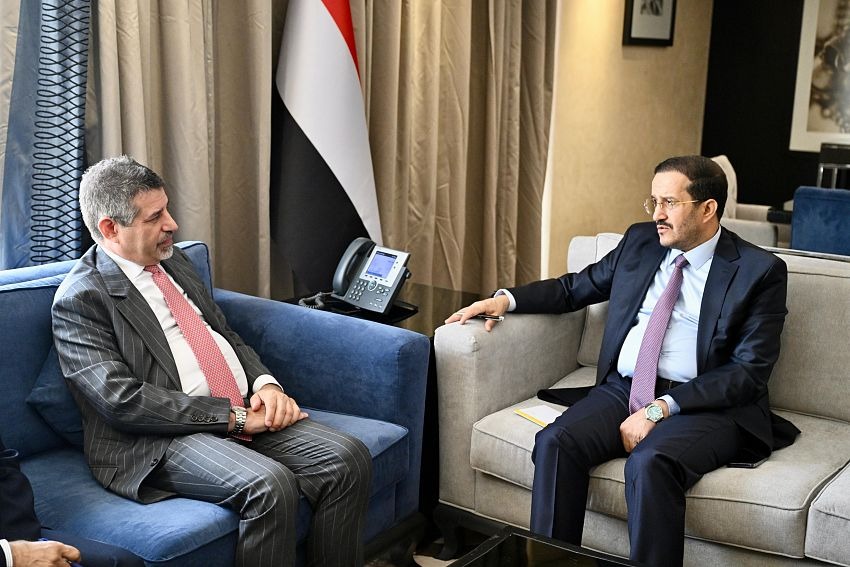


Barran Press
In a meeting held on Monday, July 15, 2024, Osman Mijalli, a member of the Presidential Leadership Council in Yemen, highlighted the council's response to its constitutional responsibilities and moral commitment to alleviate the Yemeni people from the successive crises imposed by the internationally classified terrorist group, the Houthis.
During his meeting with the United States Ambassador to Yemen, Stephen Vagen, Mijalli discussed the bilateral relations between the two friendly countries and the prospects for their development, according to the official Yemeni news agency, Saba.
Mijalli addressed the crises imposed by the Houthis, ranging from their coup and initiation of war to economic warfare.
He stated that the Houthi group exercises a policy of starving the citizens, through a series of practices that began with looting the central bank in Sana'a and seizing the joint account of the Central Bank branch in Hodeidah, which was designated for paying employee salaries under the Hodeidah Agreement.
Mijalli enumerated the violations committed by the Houthis during his conversation with the American ambassador, including "looting the pensions of retirees in the public and private sectors, as well as the salaries of state employees in all governorates of the Republic."
He asserted that the group imposed levies and taxes, manipulated the currency, and implemented unilateral economic and monetary measures, while also targeting the ports of Al-Dabba and Al-Nashima, destroying public and private assets, preventing traders and businessmen from accessing Yemeni ports, and pursuing a militant policy that harmed the currency and the overall economic situation.
Mijalli emphasized the importance of enforcing a strict policy to combat terrorism and dry up the sources of money laundering that militias utilize to finance their terrorist operations at home and abroad.
He reaffirmed the Yemeni legitimacy's commitment to its constant approach in confronting all forms of terrorism, including attempts to turn the corridors of international trade in the Red Sea and the Gulf of Aden into a tool in the hands of the Iranian regime through its regional proxies.
Additionally, Mijalli discussed the Houthis' arrest of citizens, employees of foreign embassies, international organizations, and humanitarian workers.
He stated that the continued stalling in the issue of prisoners and detainees is part of the Houthi terrorism and evidence of their savagery, ability to lie and falsify, intimidate people, and coerce employees into making confessions under torture to evade their obligations regarding services and salaries that have been plundered under the pretext of war.
Mijalli praised the role played by the Arab coalition led by the Kingdom of Saudi Arabia in supporting legitimacy in the economic and humanitarian aspects, as well as enhancing peace options in Yemen in accordance with the three references while preserving the goal of restoring the state.
In turn, the US ambassador affirmed his country's continued support for the Presidential Leadership Council and the Yemeni people in their efforts to restore the state and achieve security, stability, and peace.
He commended the responsible role and professional responsiveness of the council's president and members in all files, including the prisoners and kidnap victims file Yemenia Airways, and the central bank.
Recently, the internationally recognized Yemeni government has taken economic decisions that curtail the Houthi rebels' control over this file since they seized power in late 2014.
Earlier, the leader of the internationally classified Houthi group as a terrorist organization, in a televised speech broadcasted by Al-Masirah channel affiliated with the group, threatened to target airports and ports in Saudi Arabia, accusing it of being behind the recent decisions of the Yemeni Central Bank.
In decisions issued by Governor Ahmed al-Maibaqi, the Central Bank revoked the licenses of 26 exchange companies last week, dating back to the end of the previous month, and ordered their branches to be closed indefinitely for violating the bank's decisions and instructions.
These decisions came after two previous decisions to impose a unified network for domestic transfers, ban dealings with 12 unlicensed electronic payment entities, and completely halt operations in local financial transfer networks owned by banks, financial institutions, and exchange companies operating in Yemen.
On May 30th, in the temporary capital city of Aden, the Yemeni Central Bank issued a decision to suspend dealings with six Yemeni banks and financial institutions after the expiration of the 60-day deadline to transfer their main headquarters to Aden, as stipulated by the bank's decision.
The Central Bank also issued another decision calling on individuals, commercial establishments, companies, other entities, financial and banking institutions, who possess old banknotes issued before 2016 from various denominations, to promptly deposit them within a maximum period of 60 days from the date of the announcement.